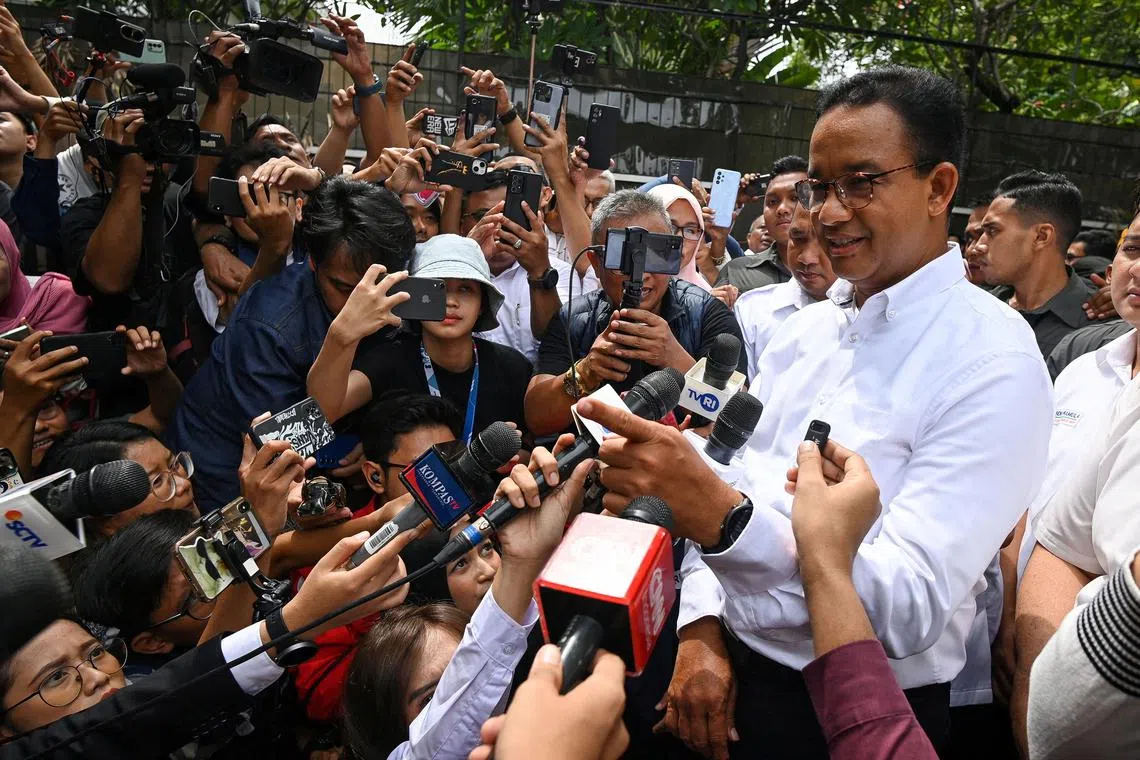Indonesia’s PDI-P drops Anies as candidate for Jakarta governor, makes surprise pick
Sign up now: Get insights on Asia's fast-moving developments

Former presidential candidate Anies Baswedan’s nomination did not go ahead because he did not want to be a PDI-P cadre.
PHOTO: REUTERS
Follow topic:
JAKARTA – Former presidential candidate Anies Baswedan was not selected by the Indonesian Democratic Party of Struggle (PDI-P) to vie for the post of Jakarta governor, despite being widely seen as the front runner in the lead-up to nomination day.
PDI-P, the country’s main opposition force, has chosen its own cadre, businessman-turned-politician Pramono Anung.
This comes after days of intense talks centred on fielding Mr Anies, who is a staunch critic of outgoing President Joko Widodo, but is not from the PDI-P.
“Do you want to join PDI-P or do you want to use PDI-P?” Mrs Megawati Soekarnoputri, PDI-P chairwoman, said in a speech during the announcement of its candidates for the regional races on Aug 26, without referring to anyone.
The Straits Times understands that Mr Anies’ nomination did not go ahead because he did not want to be a PDI-P cadre, and instead had opted to remain unaffiliated to any political party.
The vote for Jakarta’s governor is part of regional elections on Nov 27 to fill posts for 37 provincial governors, 415 regents and 93 mayors across the archipelago.
The Jakarta governorship is a high-profile political role and is seen as a stepping stone to contesting Indonesia’s presidency.
Nationalist-leaning PDI-P, which lost the presidential election but won the most seats in the last legislative election in February,
In the Feb 14 presidential poll, Mr Prabowo beat former Central Java governor Ganjar Pranowo, who ran on a ticket chiefly backed by the PDI-P, and academic-turned-politician Anies. The latter was backed by the Islamic-leaning National Awakening Party and National Democrat Party.
PDI-P’s appointment of the sociable and highly-networked Mr Pramono comes as a surprise as the 61-year-old is currently serving as Mr Widodo’s Cabinet Secretary. He has, however, been widely believed to be the main communication bridge between Ms Megawati and Mr Widodo, whose relations have gone through frequent ups and downs.
Since the February general elections, the two leaders’ relations have reached rock bottom, mainly fuelled by Mr Widodo’s choice of supporting rival presidential candidate Prabowo, instead of Mr Widodo’s own party candidate, Mr Ganjar.
Speaking to reporters before heading to the Jakarta election commission’s office to register as a candidate, Mr Pramono said he was told about his candidacy on Aug 26 – two days before registration day.
He admitted that last weekend he wished Mr Anies well in his endeavour to lead Jakarta, during the latter’s visit to the PDI-P headquarters.
Mr Pramono, who was born in Kediri, East Java province, and grew up in Yogyakarta in Central Java, said he was wearing a Jakarta ethnic outfit out of respect for the people who live there.
“This outfit is to say that I am going to knock on everyone’s heart in Jakarta with the hope I will get a mandate to contribute to Jakarta,” he added. He said he is not well-known by younger Jakartans, who make up the majority of voters.
He is going to take to the streets to get to know the people.
A survey report released in June by notable pollster Indikator Politik Indonesia revealed that Mr Anies led the ranks for choice of Jakarta governor, garnering 39.7 per cent of the votes of survey respondents.
He was followed by PDI-P cadre and former Jakarta governor Basuki Tjahaja Purnama with 23.8 per cent, and former West Java governor Ridwan Kamil with 13.1 per cent.
Mr Pramono was not on the list. He has never been on any electability opinion surveys, as he has never been named as a potential candidate.
“It is a big question why (they picked) Pramono. Why not a candidate who clearly has a high survey number?” said political analyst at the National Research and Innovation Agency, Professor Siti Zuhro, who pointed out that Mr Pramono is close to Mr Widodo.
Mr Ridwan, a political ally of Mr Widodo, will be running on a ticket backed by Mr Prabowo’s party Gerindra and the Golkar party, whose newly appointed chairman Bahlil Lahadalia is a close aide to Mr Widodo.
Observers have noted Mr Basuki, better known by his Chinese name Ahok, was not chosen by PDI-P because he was implicated in a blasphemy case, drawing a two-year jail sentence when campaigning for his re-election bid in 2017. Some observers view the case against him as politically motivated.
In the upcoming regional elections, political parties affiliated with the nation’s two most influential leaders, Mr Widodo and Mr Prabowo, have managed to form a super coalition and sidelined numerous popular rival candidates in important regions, taking advantage of the high threshold a party or coalition of parties must meet in order to nominate a candidate. The vote share threshold is based on the party’s results in the previous election.
On Aug 20, however, the Constitutional Court, in a surprise move, lowered the electoral threshold for political parties or coalitions of parties to be able to nominate candidates for local heads in the November polls – from having to win 25 per cent of the popular vote to a lower figure of between 6.5 and 10 per cent, depending on the region’s number of registered voters.
The ruling was hailed by activists as a win for democracy, as it offers a better chance to political parties and candidates opposing the dominant super coalition in key regions.
Popular candidates who had earlier been sidelined by the super coalition include Ms Airin Rachmi Diany in the Banten province race and Mr Edy Rahmayadi in the North Sumatra race.
On Aug 26, Ms Megawati announced Ms Airin as PDI-P’s governor candidate for Banten, to face Mr Andra Soni of the Gerindra party. Earlier this month, PDI-P nominated former army general Rahmayadi as a governor candidate in North Sumatra province to compete against Mr Widodo’s son-in-law, Mr Bobby Nasution.


